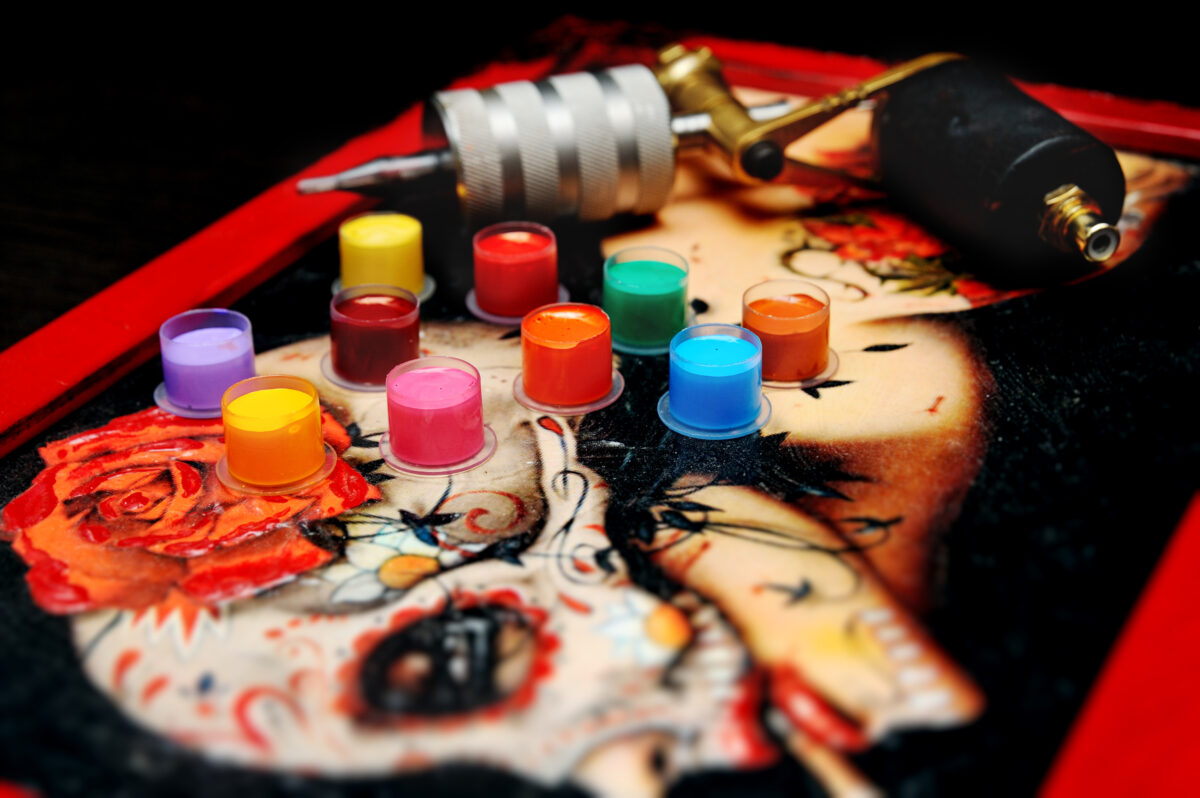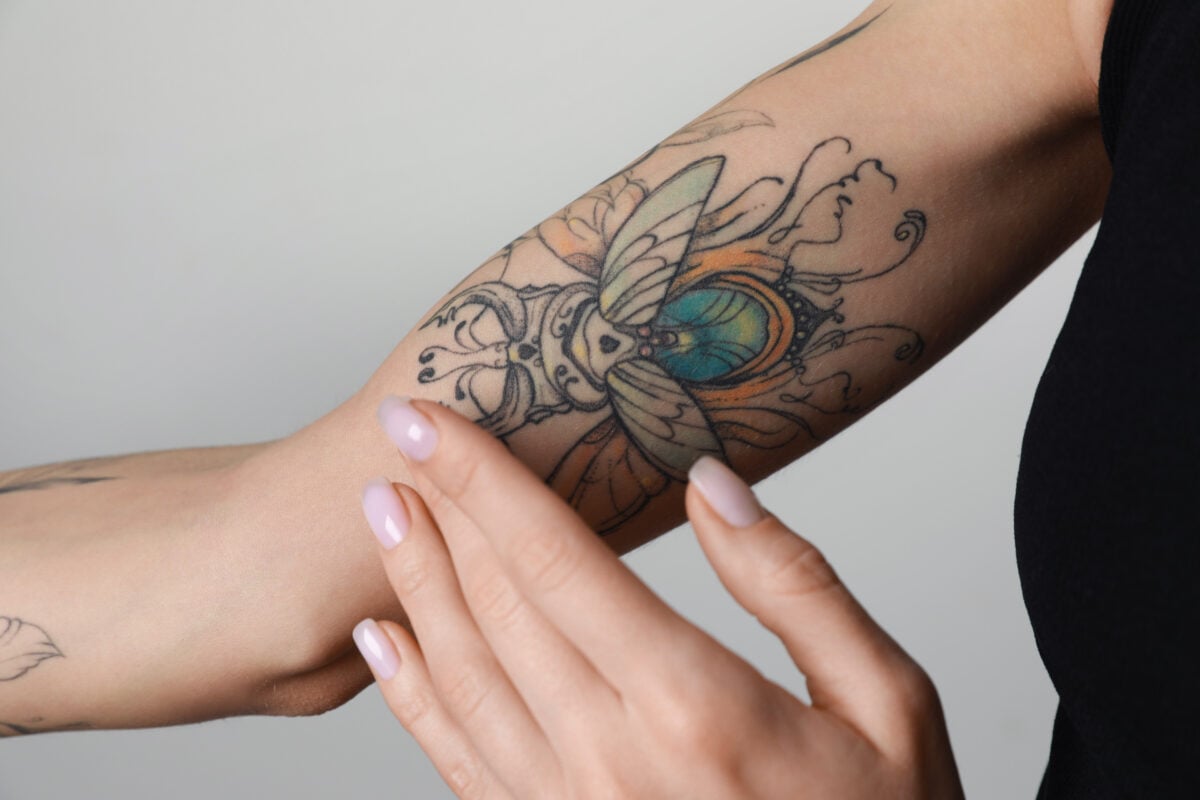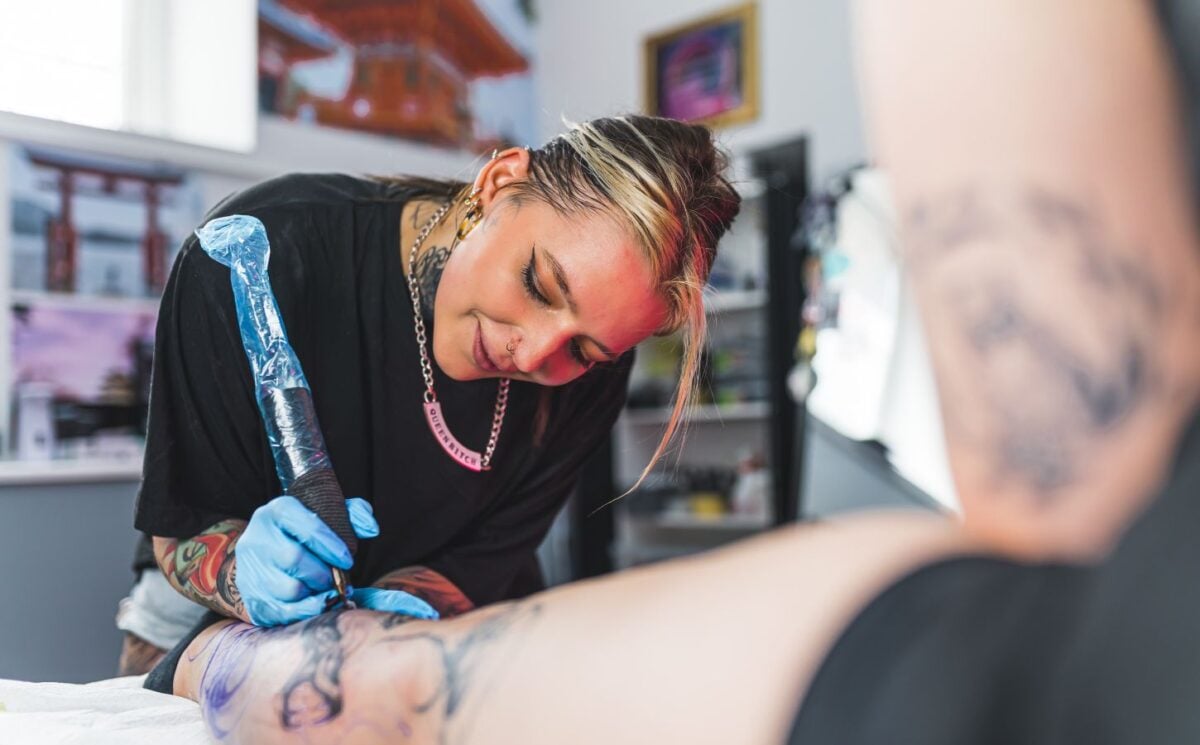The tattoo industry is booming. Over the last two decades, increased cultural acceptance in Western countries has led to tattoos becoming more common than ever throughout Europe and the US, including – much to the surprise of Grandparents everywhere – in the workplace.
If you’re a vegan considering getting inked, you may wonder if tattoos are vegan and whether it’s possible to find a cruelty-free option. Here’s everything you need to know.
The history of tattooing
This article will primarily refer to the experiences of visiting contemporary tattoo parlors in the US and UK. However, it’s important to note that tattooing is not a practice confined to the modern, Western world. Tattoos have countless forms, meanings, and cultural contexts, and the earliest evidence of tattoo art dates back to 5000 BCE Japan.
Otzi – a mummified Bronze Age man from around 3300 BC and named after the region of the Alps he was found in – is still thought to be the oldest known human with preserved tattoos and has 57 distinct markings on his skin. (Something to bear in mind when you’re telling your parents about your already in-progress bodysuit.)
In the US, tattooing had a long Indigenous history before European colonization, a practice that some Native American communities are working to bring back. Meanwhile, the African continent has one of the single oldest histories of tattooing, dating back to Ancient Egypt and Sudan around 2000 BC.
As with previous ebbs and flows in tattoo culture throughout history, the ongoing Western boom is notable specifically because it follows a period where tattoos and other body modifications were discouraged or considered taboo by society at large.
In Italy, for example, national attitudes have changed a great deal in the last decade alone, and according to an online study by WorldAtlas, nearly half of Italy’s population now has tattoos – making it one of the most tattooed countries in Europe. In the US, a recent study carried out by Pew Research Center revealed that 32 percent of Americans have a tattoo, including 22 percent who have more than one.

Are tattoos vegan?
Due in part to the tattooing boom, there are countless different shops, artists, machines, inks, and aftercare products available today. This can make it tricky to figure out exactly what materials go into making a tattoo, and whether the process is vegan or not.
Some tattoo inks may contain animal products, including bone char for deep blacks, glycerin to stabilize the ink, and gelatin or shellac as binding agents.
Bone char, or “natural carbon,” is created via the charring of animal bones. It’s used in a variety of other products and processes along with ink, including the processing of cane sugar and, in some countries, for the treatment of drinking water.
Glycerin can be derived by manufacturers from plant or animal fats by separating the fatty acids from the desirable glycerol. In tattoo inks, glycerin helps prevent the liquid from drying out in the bottle, but it also determines viscosity and carries pigment.
Animal-derived gelatin is produced by boiling bones, skin, ligaments, and tendons. These materials are typically obtained from slaughterhouses, making them products of the meat and dairy industries and unsuitable for vegans.
Shellac, which is the second most common binding agent after gelatin, is a substance secreted by lac bugs. Much like honey, the way shellac is “farmed” from exploited beetles means it is not considered vegan-friendly. Furthermore, around 25 percent of shellac the product includes crushed beetles themselves.
Can you get vegan tattoo ink?
Some tattoo inks are unsuitable for vegans as they contain the animal products listed above. However, if you already have tattoos and you aren’t sure if they were made with non-vegan ink, please don’t panic – we live in a non-vegan world, and many people have no idea that some tattoo ink contains animal products. (Though you may prefer to use one of the many vegan-friendly tattoo shops for your next one!)
During production, most of the animal ingredients in tattoo ink can simply be swapped for vegan versions, such as plant-derived pigments and glycerine, which are also widely used in the industry. Many tattoo parlors are already using vegan ink without advertising it, and there are also an increasing number of businesses that explicitly market themselves as vegan.
A huge number of vegan tattoo ink brands – along with the artists and shops – are either aware of or specifically choosing cruelty-free options during manufacturing. In fact, many renowned ink manufacturers including Eternal, Intenze, Silverback, and StarBrite all produce vegan inks.
Californian brand Quantum Tattoo Ink breaks down its ingredients list here and lists Organic vegan pigment and Kosher vegetable glycerin as alternatives to bone char and animal-derived glycerin. (Some companies claim that plant-based inks are better for clients’ health and more reliable overall, but there is no evidence to show this.)

Other tips for a vegan tattoo
Ink isn’t the only part of getting a tattoo that may not vegan-friendly. The stencil papers which artists use to transfer designs onto their customers are sometimes made using lanolin, the natural grease produced by wool-bearing animals like sheep.
Meanwhile, glycerin can be found on some disposable razors and in many of the aftercare soaps often used in tattoo shops, not just in the ink itself.
As with tattoo inks, the easiest way to find out about veganizing your entire tattoo experience is to speak with the artist. As the customer, your comfort is paramount, but tattoo artists are pros with vast knowledge of materials, processes, and results, so it’s worth taking their expert advice.
For a few simple workarounds, you could bring your own fresh razor to the appointment if the body part you’re getting tattooed is likely to need shaving. You could also choose an artist who tends to draw on designs freehand – circumventing the need for stencil paper at all.
As noted above, there are some all-vegan tattoo shops out there, and third-party aggregators like Vegan Tattoo Studios list many of them. Some shops and artists may specify that they are vegan on their websites or Instagram profiles, while others may not. The easiest way to find out if a tattoo will be vegan is to contact the shops or artists you’re interested in directly beforehand.
Even if a tattoo artist isn’t explicitly vegan themselves, requesting plant-based ink or a cruelty-free experience is common enough that many will be happy to accommodate you – or advise you of another shop or person to get in touch with.
Vegan tattoo aftercare
Following your tattoo, aftercare is important both as a way to prevent infection and ensure the long-term quality of the piece and the health of the surrounding skin. There are countless ways to do this, and the majority of people have their tried-and-true methods and products to achieve a clean heal with minimal flaws.
If it’s your first time, or you don’t know exactly what works for you yet, the best option is to simply ask the artist for any tips or recommendations. But if you want to do your research beforehand, there are a number of different vegan products.
The Aftercare Company produces a vegan version of its flagship balm, as does Easy Tattoo with its vegan Tattoo Wax, and After Inked with its Vegan Lotion Cream. Some folks simply use coconut oil, which works both as a moisturizer and anti-bacterial agent, or even unperfumed and aloe vera-rich body moisturizers.
However, even if you’re choosing your own aftercare regime, it’s best to talk to your tattoo artist about this as well, as the size, color, and location of a tattoo – plus the artist’s style – can all inform how you need to take care of it.






